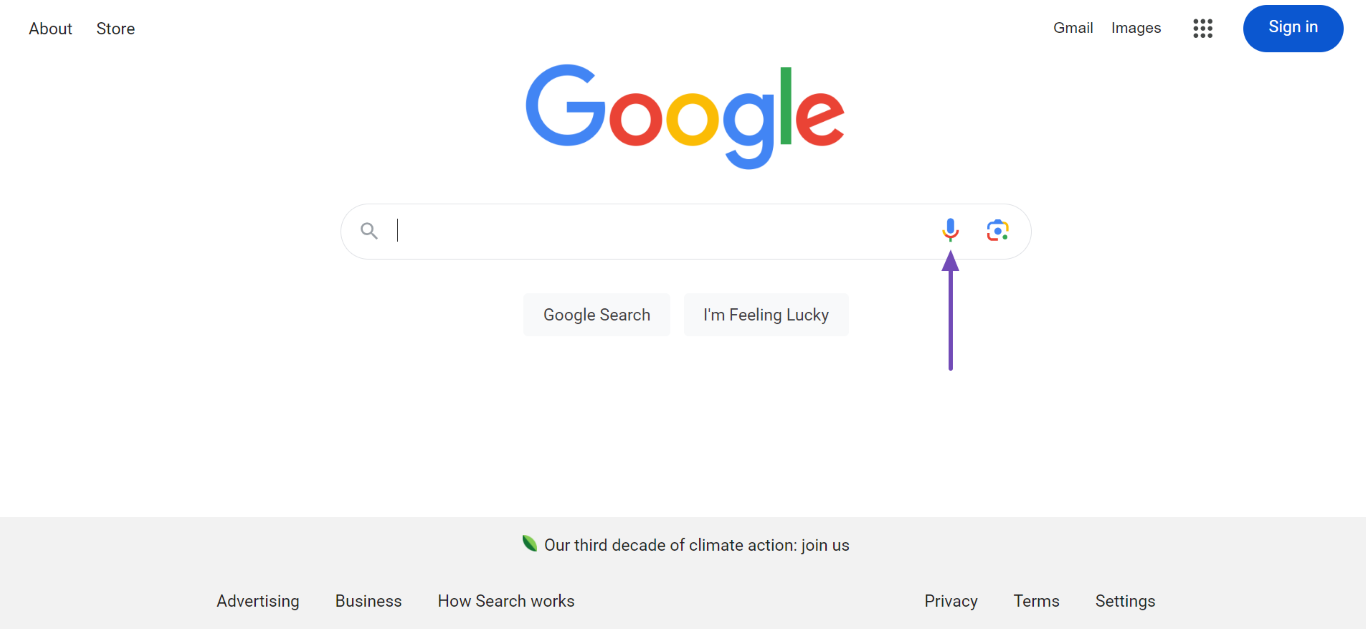What is Voice Search?
Voice search is a technology that enables users to search for information by speaking their queries instead of typing them. The technology is used on search engines and supported devices, including smartphones and smart speakers like Amazon Alexa, Google Nest, and Apple Siri.
For example, this is what the voice search button looks like on Google’s homepage.

Search engines traditionally require you to type in your search query using a keyboard. However, voice search allows you to speak your search query as long as you have a device that supports the voice search feature.
Voice search uses automatic speech recognition technology that converts your spoken search query into text. The search engine will perform your web search based on the text query.
Benefits of Voice Search
Visitors mostly use voice search because of its ease of use. Traditional search requires visitors to pull out their mobile device or desktop and then navigate to their browser or app to search for whatever they seek.
However, with voice search, they only need to speak to the device. Even in the case of mobile devices where you need to open up a browser or app to use the voice search feature, speaking your query is faster than typing.
In all, voice search is easier and faster to use than traditional search. This ensures visitors can access the information they need quicker than they usually would using traditional search.
SEO Impact of Voice Search
Voice search has changed the way people search for things online. Specifically, it changed the type of keywords we use when searching and, depending on the device, the results the search engines return.
1 Visitors Use Different Search Queries
Visitors use a more conversational tone when using voice search. As a consequence, they tend to use long-tail keywords.
For example, a visitor interested in a coffee-making machine may enter a keyword like “best coffee makers” into Google Search. However, when using voice search, they will use a more conversational keyword like “What are the best coffee makers for home use?”
Similarly, a visitor looking to research the best yoga poses for beginners would enter a keyword like “yoga poses” or “yoga poses for beginners” into the Google search bar. However, they will use a keyword like “What are the best yoga poses for beginners?” when using voice search.
2 Search Engines Display Different Results
The results search engines return for voice searches vary depending on the device. For example, Google typically returns extensive and in-depth results when you use a smart home device compared to a mobile device.
Google typically returns featured snippets for voice search results. In cases where the featured snippet is skipped or nonexistent, Google pulls the result from the top results, usually from the top five results on the page de résultats de recherche.
3 Visitors Only Use Voice Search for Certain Queries
Visitors do not resort to voice search for all queries. So, certain search terms and items get more visibility on voice search than others.
Typically, visitors use voice search to access quick information about a product or service, get factual information, or find a business or service. As a result, local businesses and certain blogs tend to receive more visibility through voice search.
4 Bloggers Changed Their SEO Strategy
Businesses and bloggers have adjusted their SEO strategy to accommodate the long-tail keywords and result types search engines return for voice search.
This is especially true for local businesses, as many visitors use voice search to find local businesses to patronize. Voice search SEO has even evolved into a distinct SEO technique, with many bloggers optimizing their sites specifically for it.
How to Optimize Your Content for Voice Search
You should optimize your site for SEO as usual. The types of sites that return for voice search results are the sites that are already ranking highly on search results pages.
1 Optimize for Long-Tail Keywords
Visitors using voice search typically use long-tail keywords. So, you should optimize your content for these long-tail keywords if you want to rank for voice search.
Since long-tail keywords are generally less competitive than short-tail keywords, it should be easier to rank for voice search queries. However, remember that voice search usually returns only one result, unlike regular search, which provides multiple results.
2 Get Your Google Business Profile
Many visitors use voice search to find businesses near their location. In such cases, Google pulls information from your Google Business Profile and uses it to provide voice search users with your business details.
Therefore, it is recommended that you sign up for a Google Business Profile if you want your business to appear in Google’s voice search results.